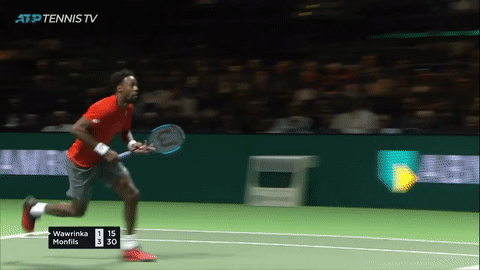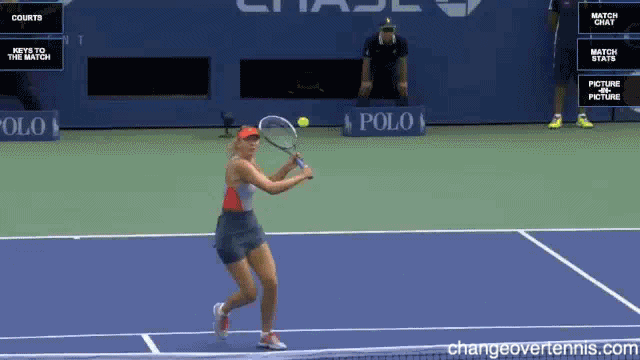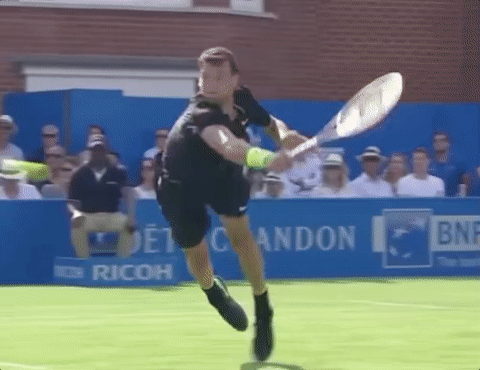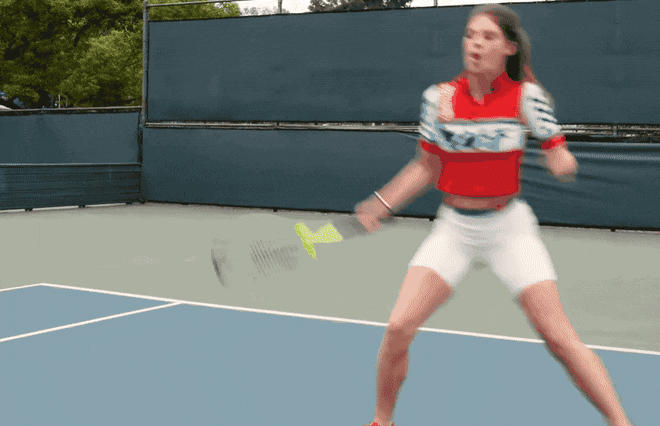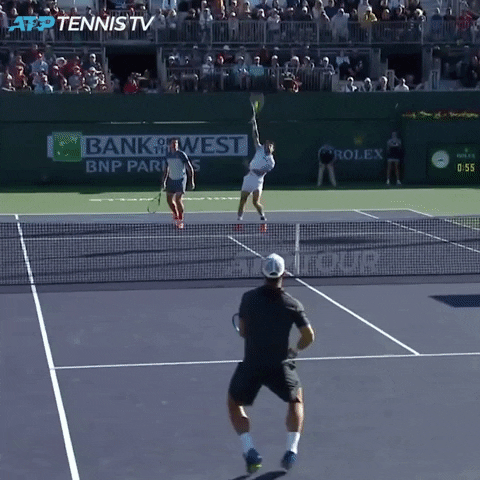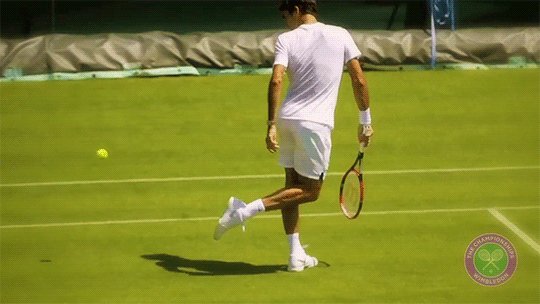Intellectual Tennis
by Kenneth Lyen

Today I invited my friends to an “intellectual game of tennis”, and someone asked me what I meant. So I decided to take this opportunity to explain what “intellectual tennis” is all about.
THE PHYSICS OF THE RACKET
Does the part of the racket that makes contact with the ball affect the ball’s motion?

How does the angle of contact between racket and ball affect play?

The angular momentum of the racket and ball before the impact is equal to the angular momentum of the racket and ball after impact:

Where: mA is the mass of the ball
IB is the moment of inertia of the racket about point O, about an axis pointing out of the page
VA' is the velocity of the ball, just after it impacts the racket. It is assumed that this velocity is parallel to VA
wB' is the angular velocity of the racket, just after it is impacted by the ball
Those who know me will know that I am out of my depth here!
PHYSICS OF THE BALL
The ball movement is also quite complex. The speed of the ball, the drag exerted by the air, its spin during flight and its spin during bounce, all can be explained by physics.
SPIN DOCTOR
The player can alter the spin by the way the ball is served:

Similarly the way the ball is returned can exert a different spin:

Then there is the difference between grass, clay and hard courts.

The aerodynamics exerted on the ball is another area of study:

MEDICAL BENEFITS OF TENNIS

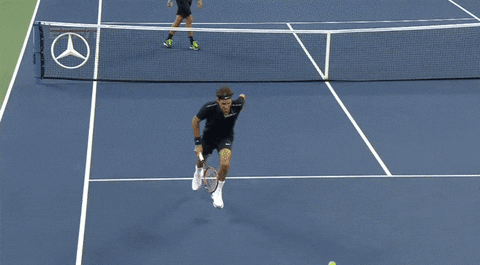
1. Boosts brain power: Does tennis increase intelligence? Well okay, I do not have precise data on this, except that there is mounting evidence that exercise in general increases intelligence. Tennis does requires the brain to think tactically, to outsmart one’s opponent by thinking creatively, strategically, and it involves planning, plus the coordination of different groups of muscles. The more tennis you practice, the connections between the nerves become reinforced and strengthened, and new neurons start developing. So exercises like tennis that requires a lot of thinking will improve memory, learning, interpersonal behavior and social skills. Therefore intelligence will improve.


2. Increases aerobic capacity. Tennis increases one's respiratory oxygen intake; the heart rate increases to deliver the oxygen and nutrients to all the muscles. Over time, it also aids in the development of numerous capillaries and capillary beds within the muscles so that the muscles can have a greater blood supply and flow. This helps in the muscles to perform at a higher level and fatigue at a slower rate. It also helps in maintaining anaerobic health, which allows the muscles to use oxygen in a better way and provide quick energy spurts for explosive power and quick, reactive movements.

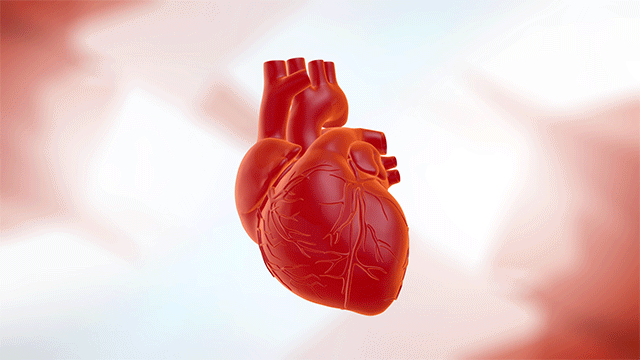
3. The heart: Although the heart rate increases while actively playing tennis, at rest, the heart rate and blood pressure will become lower. It also lowers bad (LDL) cholesterol, thereby lowering the risk of heart attacks and strokes.

4. Improves metabolic function and burns up calories. In fact it burns up calories faster than many other sports including leisurely cycling, weight lifting, golfing, dancing or playing volleyball. Tennis is a good way to lose some weight.

5. For young people it will increase bone mass and for the older person, it slows down the rate of bone mass loss.
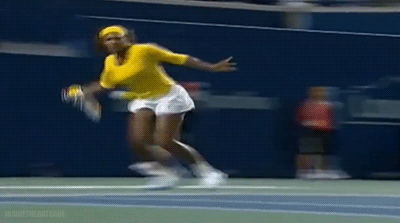
6. Enhances flexibility, balance and coordination: Tennis requires the collaboration of all parts of the body. You need to place the feet in the right position, hold the racket optimally, anticipate where the ball will travel and so you can make contact and send the ball flying over the net. All these elements must come together every time you hit the ball, and each stroke requires adaptability, coordination and balance.
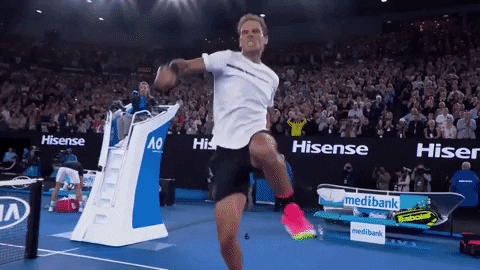
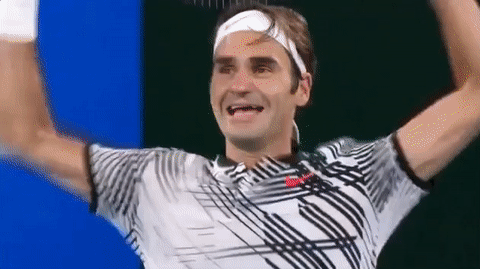
7. Boosts mood: Tennis players are less anxious, possess greater self-esteem, optimistic, and are less prone to depression than those who are sedentary or play less energetic sports.
MEDICAL INJURIES FROM TENNIS
Two-thirds of tennis injuries are due to overuse of the forearm muscles and the remaining one-third is due to injuries.

Tennis Elbow

Tennis Shoulder

Tennis Stress Fracture

Muscle Cramps
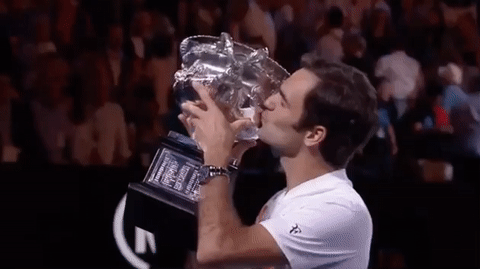
Compared to other sports, tennis attracts fewer injuries, and they tend to be relatively minor injuries that usually recover completely.

Oh, did I mention that you can sit for a tennis exam? If you pass, you will be awarded a Doctorate of Tennis at the Tennis University.
This is what I mean by “Intellectual Tennis”!
Kenneth Lyen
3 March 2019, revised 26 April 2020
